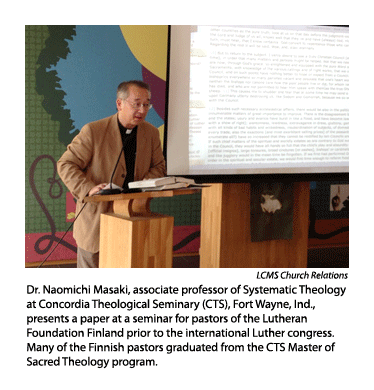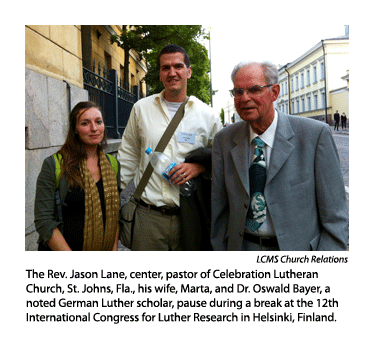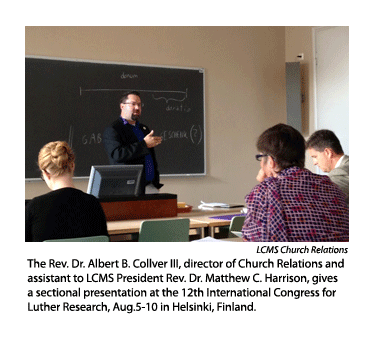By Kim Plummer Krull
While members of Celebration Lutheran Church in St. Johns, Fla., might assume that the scholarly papers presented at the 12th International Congress for Luther Research in Helsinki, Finland, would have no impact on them, their pastor suggests otherwise. 
“My eyes certainly have been opened up to what people around the world are doing with Reformation studies in new ways,” said the Rev. Jason Lane, Celebration’s pastor and one of more than 200 theologians, professors and pastors from around the globe taking part in the conference, Aug. 5-10. “I’m getting a lot of helpful illustrations and images from Luther’s writings for sermons.”
Lane, who is working on his dissertation on Luther’s interpretation of the book of James, was one of some 14 LCMS pastors and professors at the gathering. Several made presentations. During a conference break, LCMS colleagues took a moment to talk about the importance of the congress, held every five years to spotlight writings and translation projects on the life and works of the 16th century Reformation leader.
Although Luther is most closely identified with the birth of the Lutheran church, members of a variety of denominations — including Roman Catholic, Methodist and Mennonite — were among the participants, said the Rev. Dr. Albert B. Collver III, director of Church Relations and assistant to LCMS President Rev. Dr. Matthew C. Harrison.
“All the Protestant churches in the world owe their existence to Martin Luther, even if they don’t follow all his teachings by the book,” said Collver, who gave a sectional presentation titled “Luther’s Invocavit Sermons as Law and Gospel.”
Dr. Gerhard H. Bode Jr., assistant professor of Historical Theology and archivist at Concordia Seminary, St. Louis, said the conference “offers an opportunity to hear about current trends in Luther studies and helps equip us for future rese arch, writing and teaching. It’s also a good reminder that Luther’s Gospel message and, with it, the Lutheran heritage are not to be taken for granted.”
arch, writing and teaching. It’s also a good reminder that Luther’s Gospel message and, with it, the Lutheran heritage are not to be taken for granted.”
Hosted by the University of Helsinki, the congress explored the theme, “Luther as Teacher and Reformer of the University.”
For LCMS professors in attendance, the conference was “an opportunity to interact with Luther scholars from around the world and exchange each other’s insights on Luther and his theology in his historical context,” said Dr. Naomichi Masaki, associate professor of Systematic Theology at Concordia Theological Seminary (CTS), Fort Wayne, Ind.
“It is always important to understand aright doctrine that Luther was given to believe, confess and teach,” Masaki continued. “As we theologians deepen our grasp of Luther’s theology, we pray that what we teach at the seminaries and in the congregations may have evangelical contributions to form servants in Jesus Christ who teach the faithful, reach the lost and care for all.”
While the Rev. Juhana Pohjola, a pastor and dean of the Lutheran Foundation Finland (LFF), was pleased the congress drew participants from around the globe to his homeland to focus on Luther, he said the gathering also “reveals the great struggle over the heritage of Luther and the many different opinions that can be heard.”
Prior to the congress, Pohjola took part in a three-day Luther seminar presented by Masaki and LCMS colleagues for pastors with the LFF, a young and growing confessional Lutheran church body. Pohjola and several fellow pastors graduated from the CTS Master of Sacred Theology program.
“It was wonderful to see there’s a living church body that takes seriously its confessional foundation,” Pohjola said of the LCMS.
“We [Finland] have the same foundation, but it’s now more part of past tradition than everyday life. But we are grow ing,” Pohjola said of the LFF, which has blossomed from one congregation to 30 with several thousand total members over the past 15 years.
ing,” Pohjola said of the LFF, which has blossomed from one congregation to 30 with several thousand total members over the past 15 years.
As the congress drew to a close, Collver reflected on how “people tend toward different hermeneutical approaches to texts: such as a literal and historical reading to a revisionist approach that looks to what (in this case) Luther said in his day and ponders how he might have said it differently today.”
“For instance, some hold to how the proper distinction between Law and Gospel was a major consideration for Luther’s approach, while others believe there are new and better paradigms to Law and Gospel, such as two kinds of righteousness … ,” Collver said on the Witness, Mercy, Life Together blog (www.wmltblog.org). “Dr. Mark Mattes’ [associate professor of Religion and Philosophy, Grand View University] paper, ‘Luther’s Use of Philosophy,’ held that the proper distinction between Law and Gospel governed Luther’s appropriation and use of philosophy.”
Attendance at this congress was reportedly among the largest in recent years. The Rev. John T. Pless, assistant professor of Pastoral Ministry and Missions at CTS, is not surprised. “The voice of Luther is still a captivating and intriguing voice to Christians across the world,” he said.
Even non-Christians are drawn to Luther’s writing, Pless added, even though they don’t really understand what it’s all about.
The strong congress turnout also signals that “world Lutheranism is gearing up for the 500th anniversary of the Reformation in 2017,” Pless said. “It’s another reason to look forward to a very robust celebration of the anniversary in Wittenberg, Germany.”
Not so coincidentally, the next International Luther Congress is set for 2017 in Wittenberg.
Other LCMS leaders at the International Lutheran Congress included the Rev. Dr. Roland Ziegler of CTS; the Rev. Dr. Timothy Dost, the Rev. Dr. Erik Hermann, the Rev. Dr. Robert Kolb, the Rev. Dr. Paul Robinson, the Rev. Dr. Robert Rosin, the Rev. Dr. William Schumacher — all of Concordia Seminary, St. Louis; Dr. Christopher Brown, associate professor of Church History, Boston University; and the Rev. Jonathan Mumme, international tutor, Westfield House, Cambridge, England.
Kim Plummer Krull is a freelance writer and a member of St. Paul’s Lutheran Church, Des Peres, Mo.
Posted Aug. 10, 2012




